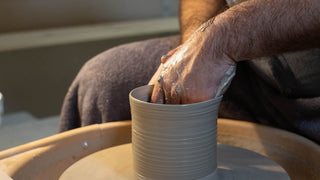1. Don't confuse the way with the goal
Beginners tend to have far too high expectations. Often, you expect to actually make pots the first few times you try. Pottery is a craft and as such it takes a lot of patience and dedication to be learned. If you focus on a finished piece too soon, you risk becoming discouraged and, in the worst case, losing interest in pottery. It is helpful to think of the learning process as a journey. Explore the steps needed to reach your goal. Learn how to wedge clay, how to center it, one step at a time. This requires patience, but the less you look for shortcuts in the process, the better you will potter in the future.
2. Dare to make mistakes
Mistakes are an important part of the learning process. Those who fear making mistakes will never push the limits. Especially in the beginning, it is important to explore the limits. At first, try to throw as high and thin as possible. At Best until the clay collapses on its own. Instead of trying to throw something beautiful, practice throwing taller and thinner. Over time you will get a sense of how far you can go.
3. Build yourself an infrastructure
Arguably the most underestimated part of making pottery is the working environment. We too started with just a potter's wheel and a kiln. We wedged the clay on the floor and cleaned the tools in the bathtub. That's how you quickly lose the desire to make pottery. A good infrastructure supports pottery making and makes it easy to learn. What you need in terms of materials, tools and equipment varies from person to person, but here are some basic things you should have in your workshop:
- A table at working height, for wedging clay
- Sink with running water and clay separator
- A couple of plaster boards to prepare the reclaimed clay
- A blender
- A scale
- A banding wheel
- A couple of buckets with lids for storing leftover clay
- foil for covering
- A box with a lid for storing the reclaimed clay
- towels & sponges
Conclusion:
I like to compare learning to make pottery with learning to play an instrument. At first it seems difficult and unfamiliar. But you will soon achieve great results if you can stick with it, enjoy it and focus on the small successes. Set up your workspace so that you can get to work at any time without too much effort, and take small steps, and you will soon be creating great ceramics.

